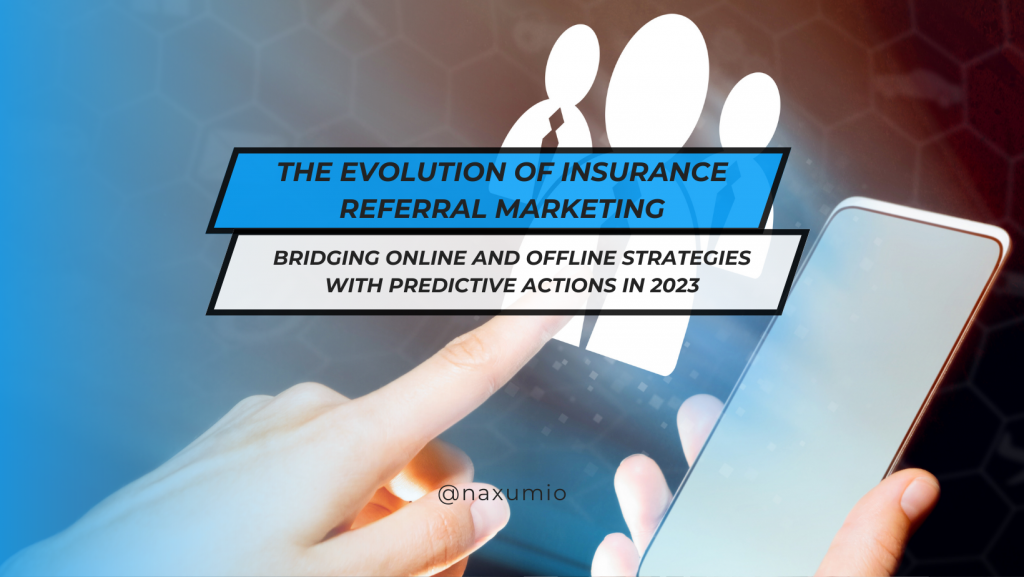The Evolution of Insurance Referral Marketing: Bridging Online and Offline Strategies with Predictive Actions in 2023
Posted by Diana Faye Cichon / August 25, 2023
In the ever-evolving world of insurance, attracting new clients remains a top priority. One proven strategy in the arsenal of insurance companies is referral marketing. However, in the digital era of 2023, insurers are facing a crucial decision: Should they focus on online or offline referral marketing strategies?

In this blog, we’ll delve into the strengths and weaknesses of each approach and explore how predictive actions can bridge the gap between them to enhance your insurance business.
Online Referral Marketing: Unleashing the Digital Potential
- Leveraging the Power of Social Media: In this age of digital connection, online referral marketing enables insurance companies to reach vast potential customer pools. By motivating content clients to spread their positive experiences through social networks, a viral effect can occur, significantly expanding your client base.
- Precise Tracking and Analytics: Online referral programs often use advanced tracking mechanisms. It enables insurers to measure the effectiveness of their campaigns, pinpoint the most successful channels, and make real-time data-driven adjustments.
- Global Reach: Online strategies know no geographical boundaries. Insurers can reach clients and potential clients worldwide, dramatically extending their market reach.
- Cost-Effective Solutions: Unlike traditional offline methods, online referral marketing is often more cost-effective. Setting up and maintaining a referral program through digital channels typically requires fewer resources, offering a potentially higher return on investment.
However, it’s not all smooth sailing in the online realm:
- Saturation: With many businesses clamoring for attention online, it can be challenging to stand out. Competition is fierce, and consumers might grow immune to referral requests.
- Trust Issues: Building trust in the digital realm can be a hurdle. Potential customers might be skeptical of online reviews and referrals, fearing they are biased or fabricated.
- Privacy Challenge: Collecting referral data while protecting customer privacy is tricky.
Offline Referral Marketing: The Human Touch
- Nurturing Personal Relationships: Offline referral marketing thrives on personal connections and word-of-mouth. Insurers can utilize their relationships with existing clients, motivating them to recommend your services to friends, family, and colleagues.
- Community Engagement: Actively participating in local events, charities, and sponsorships can strengthen your ties to the community. It fosters trust and loyalty among clients, resulting in more referrals.
- In-Person Trust Building: Face-to-face interactions often carry more weight in terms of trust. Clients are more inclined to refer to others if they’ve had positive experiences during in-person meetings.
- Targeted Approach: Offline referral marketing allows insurers to target specific groups or regions for referrals in specialized markets.
However, offline referral marketing presents its own set of challenges:
- Limited Reach: Offline strategies inherently have a limited reach compared to their online counterparts. The potential pool of referrers and referees is smaller.
- Resource-Intensive: Hosting events, attending local functions, and maintaining personal relationships can be resource-intensive, potentially making them cost-prohibitive for some insurers.
Predictive Actions: Bridging the Gap for Insurers
offline referral marketing. Introducing predictive actions, an advanced method that uses data analytics and artificial intelligence to predict customer behaviors and preferences. Let’s see how these predictive techniques can boost both online and offline strategies:
- Precision Targeting: Predictive analytics can identify the most likely referrers and referees, ensuring that marketing efforts are focused on those with the highest potential for conversion, whether you’re working online or offline.
- Personalization: By analyzing customer data, insurers can personalize referral requests and incentives, making them more appealing and relevant to individual clients, regardless of the marketing channel.
- Optimized Timing: Predictive models can determine the best times to ask for referrals, increasing the likelihood of a positive response in online and offline interactions.
- Continuous Improvement: Predictive analytics allow for ongoing refinement of referral strategies, making them more effective, whether leveraging digital platforms or personal connections over time.
In 2023, insurance companies benefit most from a comprehensive approach. A strategy that combines online reach with offline trust-building, enhanced by predictive actions, can yield remarkable results. Regardless of the chosen plan, one thing remains constant: prioritizing customer satisfaction, trust-building, and transparent communication is essential for a successful referral marketing program in the insurance industry.
Conclusion: Where Expertise Meets Technology
Naxum bridges the gap between human expertise and technological assistance in this digital transformation era. By studying successful expert practices, Naxum offers personalized guidance, enabling intelligent decision-making and exceptional customer experiences.
Schedule a demo with NaXum today to unlock the potential of predictive actions and take your insurance referral marketing to the next level in 2023!